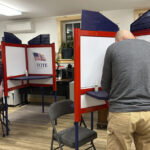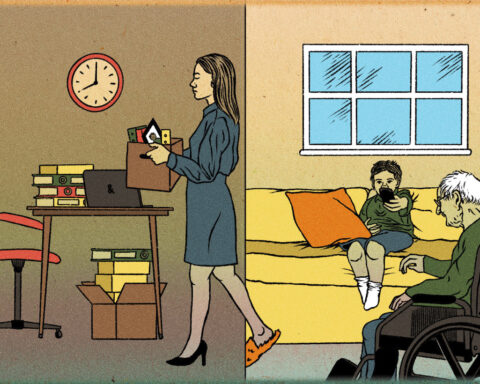Arguing politics with loved ones can quickly spiral into personal attacks that damage relationships. Experts say our political views become tied to identity, making dissent feel like a personal affront. This breeds defensiveness and strips nuance from debates. With partisanship rising nationally, Americans increasingly view opposing parties negatively. Growing polarization fuels emotional confrontations over issues. Figures show 35-45% of partisans now oppose interparty marriages in the family.
I recently experienced this phenomenon firsthand. A discussion about politics with my brother rapidly devolved into hurtful statements. It ended with him blocking me on social media. We haven't spoken since aside from a obligatory birthday text. While such blowups damage bonds, avoiding political talks altogether has costs. Open conversations bridge divides. Here experts offer tips on keeping election-season talks productive, not pugilistic.
Our political ideals and morality are strongly represented. Opinions correspond with one's sense of self. "When political perspectives are questioned, the brain becomes engaged in areas linked to personal identity, the response to threats, and emotions," states psychologist Kristi Phillips. Attacks on opinions feel like attacks on self. Issues also become tied to polarizing figures. We react to policy based on our feelings about its source. "You find yourself in repetitive debates where no one can 'succeed' because you are no longer discussing the real policies," states Vaile Wright from the American Psychological Association.
This morphs policy debates into personal beefs over politicians. If we dislike the messenger, we reject the message. This shortcut thinking blocks nuanced talks. We talk past each other, not to each other. Partisanship breeds "in group" and "out group" mentalities. "You’re on this side or you’re on the opposite side, and there’s nowhere in between," Wright says. Viewing the other side as the enemy removes empathy required for healthy debates.
Factious politics strain family relationships. The expectation of harmony makes disagreements more jarring. But some dissent is normal, especially between generations. "As you grow older, you begin to question some of that and develop your own thoughts and ideas about things," Wright adds. Diverse perspectives should be expected, though often prove difficult.
For children, opposing parents can seem like failure. For parents, children rejecting their values causes pain and self-doubt. But viewpoint shifts are part of kids developing critical thinking skills.
Totally avoiding political conversations has downsides. Cross-divide talks bridge understanding when done right. Some tips: Don't expect to change minds. Enter talks seeking to understand different views, not convert. Open questions and empathy work better than arguments. Highlight shared beliefs upfront. This eases defensiveness so substantive debates can unfold. Avoid personal attacks.
Take slow, calming breaths when tensions rise. Politely change topics if needed. Setting expectations and boundaries helps. Make "I" statements, not "you" statements. Explain how certain remarks affect you, don't attack the speaker. Actively listen and connect with underlying emotions motivating views. Seeking to understand defuses knee-jerk reactions.
Reflect after blowups about your own patterns. Judging yourself helps spot areas for improvement. Consider taking short breaks from tense talks. But sometimes relationships become too toxic to salvage through communication alone. Debates consistently devolving into personal abuse may warrant reevaluation. "If the relationship is starting to impact your ability to function in a significant manner...then those are warning signs," Wright adds.
Taking space doesn't have to be permanent. Gently process feelings without self-judgment. With midterms looming, high emotions around issues are unavoidable. But empathy, open ears and minds can lead to enlightening exchanges. The goal is expanding perspectives, not winning at all costs.
Approaching debates with care and avoiding demonization preserves relationships amid turmoil. Families containing multitudes of views remain viable if discussions enlighten more than inflame.

 Peyote sacred to Native Americans threatened by psychedelic renaissance and development
Peyote sacred to Native Americans threatened by psychedelic renaissance and development
 Trump has pressed for voting changes. GOP majorities in Congress will try to make that happen
Trump has pressed for voting changes. GOP majorities in Congress will try to make that happen
 US holiday retail sales come in above forecast, Mastercard says
US holiday retail sales come in above forecast, Mastercard says
 Middle East latest: 5 Palestinian journalists killed by Israeli strike, Gaza Health Ministry says
Middle East latest: 5 Palestinian journalists killed by Israeli strike, Gaza Health Ministry says
 Why this Mexican American woman played a vital role in the US sacramental peyote trade
Why this Mexican American woman played a vital role in the US sacramental peyote trade
 What is the Native American Church and why is peyote sacred to members?
What is the Native American Church and why is peyote sacred to members?
 AI is a game changer for students with disabilities. Schools are still learning to harness it
AI is a game changer for students with disabilities. Schools are still learning to harness it
 Futures lower in holiday-thinned trading
Futures lower in holiday-thinned trading
 Family Feuds
Family Feuds







